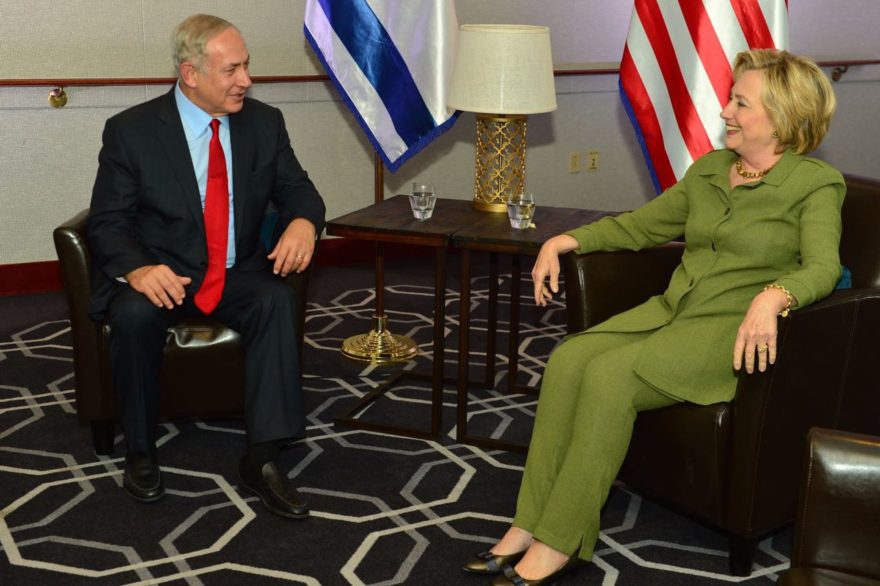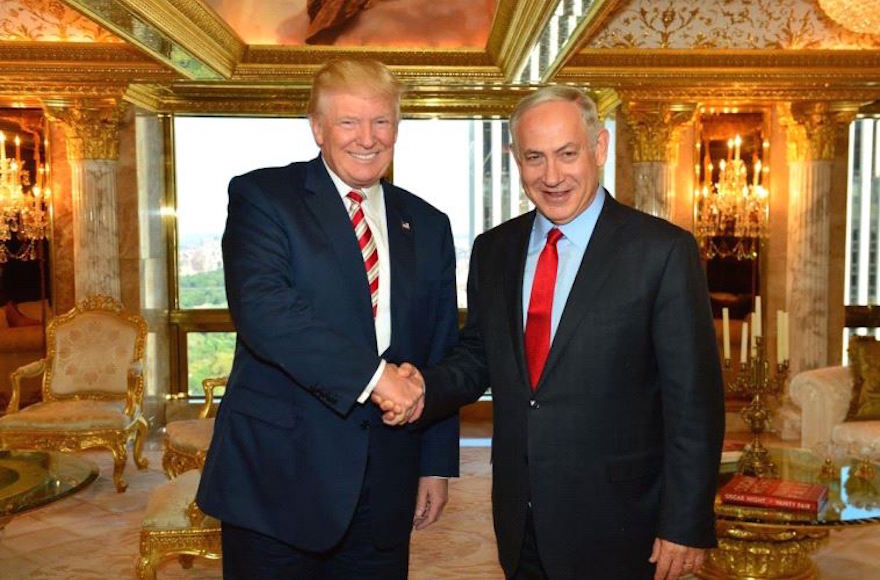Clinton and Trump, meeting with Netanyahu, share commitment to alliance
Published September 26, 2016

Israeli Prime Minister Benjamin Netanyahu meets on Sunday Sept. 25 in New York with Hillary Clinton. (Kobi Gideon/Israel Government Press Office.)
WASHINGTON (JTA) — Hillary Clinton said she opposed any U.N. Security Council bid to impose a solution to the Israeli-Palestinian conflict, during a meeting with Israeli Prime Minister Benjamin Netanyahu just hours after a summit between the Israeli leader and Donald Trump.
Netanyahu’s meetings with the Democratic nominee and, earlier Sunday, with her Republican rival were a study in similarities – principally, in pledging close defense cooperation with Israel – and differences, especially in Clinton’s holding up Israel as a model for pluralism, and Trump lauding its erection of a wall of separation from the Palestinians.
“The secretary reaffirmed her commitment to work toward a two-state solution of the Israeli-Palestinian conflict negotiated directly by the parties that guarantees Israel’s future as a secure and democratic Jewish state with recognized borders and provides the Palestinians with independence, sovereignty, and dignity,” said a statement from the presidential campaign of the former secretary of state.
“Secretary Clinton reaffirmed her opposition to any attempt by outside parties to impose a solution, including by the U.N. Security Council,” the statement said.
Netanyahu, who is in New York to attend the opening of the U.N. General Assembly, met with the nominees on the eve of their first debate. He met with Trump at the real estate developer’s headquarters in Manhattan, Trump Tower. He met with Clinton at the W Hotel in the same borough; her headquarters is across the river, in Brooklyn.
The Israeli prime minister sought assurances that neither nominee would join international efforts to preempt direct Israeli-Palestinian peace talks. Palestinian officials prefer international mediation until Israel freezes settlement expansion. Israel wants direct talks.
Netanyahu also reportedly fears that President Barack Obama will in his final months in office allow a U.N. Security Council resolution outlining a final status for a two-state solution to go through, although Obama has taken pains until now to keep that from happening, and has not indicated any plans to reverse course.
Unlike Clinton, Trump in his statement did not explicitly commit to opposing outside attempts to impose a solution, but he did check off other boxes on Netanyahu’s list of expectations from U.S. nominees, including the expectation that Palestinians recognize Israel as a Jewish state and his pledge to recognize Jerusalem’s capital.
Clinton did not mention Jerusalem in her statement, but she affirmed Israel’s status as a “democratic Jewish state.” She said she would enforce last year’s deal between Iran and six major world powers to exchange sanctions relief for a rollback of nuclear development. Netanyahu vehemently opposed the deal. Trump’s statement said only that the two men discussed the deal at length; Trump in the past has said he would renegotiate the deal.
Clinton in her statement committed herself to combating the boycott Israel movement; Trump did not mention it. Both nominees swore to uphold defense assistance for and cooperation with Israel.
Clinton affirmed “the common values of democracy, equality, tolerance, and pluralism.” Trump’s statement said he “recognized that Israel and its citizens have suffered far too long on the front lines of Islamic terrorism” and discussed with Netanyahu Israel’s security wall in the West Bank.
One of the keenest differences in this election has been over diversity; Clinton embraces it, while Trump has delivered broadsides against Muslims and Mexicans and has pledged to build a wall between the United States and Mexico.
Israeli Prime Minister Benjamin Netanyahu meets on Sunday Sept. 25 in New York with Hillary Clinton. (Kobi Gideon/Israel Government Press Office.)
Netanyahu’s office issued terse statements after both meetings. The statement after the meeting with Trump noted that his ambassador to the United States, Ron Dermer, and Trump’s son-in-law Jared Kushner, were present at the meeting. The statement after the meeting with Clinton noted that Dermer and Clinton’s top foreign policy adviser, Jake Sullivan, were also in attendance. He noted both meetings with photos on Twitter. The handshake with Trump was set against the opulent gold leaf background of the nominee’s office; the handshake with Clinton was set against Israeli and American flags.

Donald Trump and Benjamin Netanyahu meeting in Trump Tower in New York, Sept. 25, 2016. (Trump Campaign)















